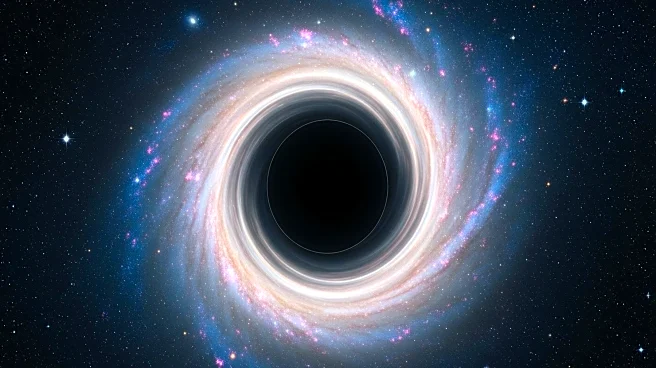What is the story about?
What's Happening?
An international team of astronomers has identified a black hole that is not located at the center of its galaxy, a finding that challenges traditional views of black hole behavior. This discovery was made by researchers from the Shanghai Astronomical Observatory and was published in Science Bulletin. The black hole, located in a dwarf galaxy named MaNGA 12772-12704, is approximately 3,260 light-years from the galaxy's core. Unlike typical black holes that are found at the centers of galaxies, this one is roaming through the galaxy. The team used data from the MaNGA survey and the Very Long Baseline Array (VLBA) to observe the black hole, which has a mass about 300,000 times that of the Sun. The black hole is actively feeding, as indicated by a jet extending 7.2 light-years and temperatures near 1 billion degrees Celsius.
Why It's Important?
This discovery is significant as it suggests that black holes can exist and grow outside the central regions of galaxies, which could lead to a reevaluation of how black holes and galaxies co-evolve. The presence of such a black hole in a dwarf galaxy indicates that similar phenomena might be more common than previously thought. This could provide insights into the rapid growth of massive black holes in the early universe. The study also raises the possibility that some black holes might leave their host galaxies and enter intergalactic space, potentially affecting nearby galaxies. Understanding these processes is crucial for comprehending the lifecycle and evolution of black holes.
What's Next?
Researchers will likely continue to study galaxies like MaNGA 12772-12704 to gain further insights into the behavior and evolution of intermediate-mass black holes. Theoretical models will be developed to predict the movement of such black holes and their potential impact on surrounding star systems. This research could lead to a better understanding of the transitional stages between smaller stellar remnants and supermassive black holes.
Beyond the Headlines
The discovery of a wandering black hole highlights the complexity and dynamism of the universe. It challenges the notion that black holes are static entities confined to the centers of galaxies. This finding could lead to new theories about the formation and growth of black holes, as well as their role in shaping galaxies. It also underscores the importance of advanced observational techniques in uncovering hidden aspects of the cosmos.
















